|
|
|
Sort Order |
|
|
|
Items / Page
|
|
|
|
|
|
|
| Srl | Item |
| 1 |
ID:
133292
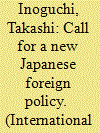

|
|
|
|
|
| Publication |
2014.
|
| Summary/Abstract |
Japanese foreign policy is at a crossroads. A global power transition is under way; while the United States remains the leading global power, across the globe non-western developing states are on the rise. Within Asia, China is a growing presence, wielding expansive claims on islands and maritime rights, and embarking on a defence buildup. As power shifts across Asia and the wider world, the terms of leadership and global governance have become more uncertain. Japan now finds itself asking basic questions about its own identity and strategic goals as a Great Power. Within this changing context, there are three foreign policy approaches available to Japan: (1) a classical realist line of working closely with the US in meeting China's rise and optimizing deep US engagement with China by pursuing a diplomacy focused on counterbalancing and hedging; (2) a transformative pragmatist line of rejuvenating itself through Abenomics and repositioning itself in East Asia; and (3) a liberal international line of pursuing a common agenda of enhancing global liberal-oriented norms and rules through multilateral institutions along with the United States and the Asia-Pacific countries. Current Japanese foreign policy contains a mix of all three approaches. The article argues that a greater focus on the second and the third lines would enhance the current approach; it would ensure that Japan is more in harmony with the global environment and help it work positively for global and regional stability and prosperity, thus enabling Japan to pursue an 'honorable place in the world' (as stated in the preamble to its constitution).
|
|
|
|
|
|
|
|
|
|
|
|
|
|
|
|
| 2 |
ID:
163754
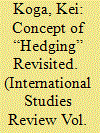

|
|
|
|
|
| Summary/Abstract |
This article argues that the concept of “hedging” should be understood in the context of the “balancing-bandwagoning” spectrum within the “balance of power” theory, in which hedging is located between balancing and bandwagoning as the state's third strategic choice. Although polarity— unipolar, bipolar, and multipolar—largely determines the likelihood of hedging behavior, during a period of power shift, strategic uncertainty emerges. States, particularly secondary powers, attempt to calculate the risk of balancing, bandwagoning, and hedging, adopting an optimal strategy. To identify states’ strategic behavior, it is important to first examine their economic and military capabilities, and if these indicators are not decisive enough to identify balancing, bandwagoning, or hedging behavior, diplomatic factors should be taken into account, although those are a relatively weaker indicator.
The use of this conceptual framework reveals that Japan's foreign policy behavior has not involved “hedging” vis-à-vis China; instead, Japan's behavior is consistently associated with “balancing” against the risks of China's rise. In addition, while Japan's behavior vis-à-vis the United States is considered to be bandwagoning, Japan made political efforts to strengthen its own military capabilities—internal balancing—which began in the 2010s when Japan relaxed its political constraints on use of its military. This behavior also aimed both to illustrate Japan's efforts related to alliance burden-sharing and to enhance its external balancing with the United States. Yet, the periods from 1997 to 2005 and from 2010 on represent an aberration because Japan engaged one type of hedging—security hedging—vis-à-vis the risk of US commitment reduction to East Asia. In this sense, while concurring with the realists’ argument that Japan's current behavior is characterized as balancing, the argument differs from that of realists who believe that Japan's policy shift to balancing toward China only began with China's rise in the late 2000s or 2010s.
|
|
|
|
|
|
|
|
|
|
|
|
|
|
|
|
| 3 |
ID:
145143
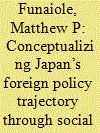

|
|
|
|
|
| Summary/Abstract |
Regional security studies of the Asia-Pacific commonly center upon China’s rise, leaving other actors underresearched. Among these is Japan, whose ongoing reinterpretation of its pacifist constitution may destabilize the region. This article employs Social Identity Theory, a social psychology theory of group behavior, to develop a unique framework that accounts for both the domestic and international constraints acting upon Japan’s foreign policy makers. By analyzing Japan’s foreign policy evolution through the lost decade of the 1990s into the changed landscape of the post-September 11th world, this article identifies a prevailing trend toward “normalization”. It is argued that Japan is on course to further distance itself from the pacifism embodied in Article 9 of its constitution.
|
|
|
|
|
|
|
|
|
|
|
|
|
|
|
|
| 4 |
ID:
138748
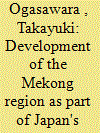

|
|
|
|
|
| Summary/Abstract |
Japan's active engagement in the development of the Mekong region since the 1990s needs to be understood not only from an economic but also from a diplomatic perspective. Japan seeks to collaborate with ASEAN in facilitating multilateral “political dialogue” in the Asia-Pacific region and building an East Asian order based on “universal values” such as democracy and the rule of law, and the Mekong region could be the “weakest link” of ASEAN. After outlining Japan's twenty-year undertaking to cultivate Mekong-Japan cooperation, the author suggests that it is time to broaden the scope of the cooperation and accelerate Japan's “proactive contribution to peace” policy to cope with the changing security environment.
|
|
|
|
|
|
|
|
|
|
|
|
|
|
|
|
| 5 |
ID:
093860
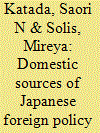

|
|
|
|
|
| Publication |
2010.
|
| Summary/Abstract |
The conventional view in the field of international political economy - that greater economic interdependence creates an incentive for active foreign policy engagement - is hard to reconcile with Japan's foreign economic policy. To explain this counterintuitive outcome, we develop a new model of domestic demand for policy activism that integrates strands of prospect theory, collective action, and interest aggregation. We argue that both the rationale for mobilization and lobbying capacity are essential elements in understanding the domestic demand for significant foreign policy departures. We apply this conceptual framework to Japanese foreign economic policy in two issue areas: finance (Japan's response to the 1980s Latin American debt crisis and the late 1990s Asian Financial Crisis), and trade (Japan's Free Trade Agreement negotiations with Mexico and South Korea).
|
|
|
|
|
|
|
|
|
|
|
|
|
|
|
|
| 6 |
ID:
189257
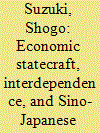

|
|
|
|
|
| Summary/Abstract |
China’s increasingly active economic diplomacy in recent years has often been deeply linked to its geostrategic interests. Japan is said to be watching this development with alarm. Analysts have often claimed that this has resulted in Sino-Japanese rivalry, where the Japanese see any gains made by China in zero-sum terms, and make concerted efforts to counter China’s growing influence. This article, however, is critical of such views. While elements of rivalry may indeed be visible in some aspects of Sino-Japanese relations, it would be premature to apply this perspective to economic statecraft, which is inherently multifaceted. This article claims that too much attention has been paid to the strategic aspects of Chinese economic statecraft at the expense of economic/commercial ones that could foster cooperative relations between Beijing and Tokyo. It argues that Japan does not hold a monolithic view that Chinese diplomatic activities in the economic realm are an axiomatic threat to Japanese security interests, and it remains premature to say that Japan and China are ‘rivals’ in the realm of economic statecraft. Future analysis in this area needs to pay greater attention to the complicating effects that economic interdependence can have in strategic policies.
|
|
|
|
|
|
|
|
|
|
|
|
|
|
|
|
| 7 |
ID:
091105
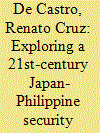

|
|
|
|
|
| Publication |
2009.
|
| Summary/Abstract |
The article examines Tokyo's efforts to link the Philippine and the Japanese security spokes in the face of Beijing's moves to widen the cleavage between both countries' alliances with the U.S. and render them irrelevant. The article concludes that Manila and Tokyo must first reconfigure a defense relationship that is not merely a military aggregation but a political apparatus enabling them to constructively engage an emergent China.
|
|
|
|
|
|
|
|
|
|
|
|
|
|
|
|
| 8 |
ID:
086622
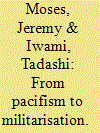

|
|
|
|
|
| Publication |
2009.
|
| Summary/Abstract |
The pacifist commitment contained in Article 9 of the Japanese constitution has long been a source of scholarly interest and debate. While the insertion of the clause in the post-Second World War constitution was originally justified by General MacArthur (amongst others) as an expression of the 'high ideals' of liberalism and democracy that Japan was now embracing, it has since been derided as an impediment to effective Japanese participation in wars fought by the United States that are claimed to be in defence of freedom and democracy. This reversal of liberal logic became evident in the early years of the Cold War as Japan was encouraged to support the US in the Korean War and has strengthened in the years since. From the first Gulf War of 1991, up to the current War on Terror, much has been made of the constraints that Japan faces in supporting the 'defence of freedom' on a global scale. This paper aims to show the place of liberal discourses in relation to the pacifist clause in order to highlight the great ambiguity and inconsistency that exists in liberal claims concerning the promotion of peace in international affairs. In the context of tensions over Taiwan and North Korea, as well as the potential for controversial 'humanitarian' roles for the Japanese military in the South Pacific, these normative questions aim to shed light on the potential dangers of Japanese remilitarisation on liberal-internationalist grounds.
|
|
|
|
|
|
|
|
|
|
|
|
|
|
|
|
| 9 |
ID:
170646


|
|
|
|
|
| Summary/Abstract |
This article deals with the activities of the well-known Soviet diplomat I. Maisky starting in 1927, as the charge d'affaires and then the advisor to the Soviet mission in Japan. The article is based mainly on the correspondence of the diplomat, who analyzed the state of Soviet-Japanese relations in the second half of the 1920s and described Japanese foreign policy, especially in China. Of particular interest are the recommendations by I. Maisky concerning relations between the U
|
|
|
|
|
|
|
|
|
|
|
|
|
|
|
|
| 10 |
ID:
141734
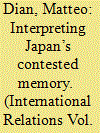

|
|
|
|
|
| Summary/Abstract |
This article applies an interpretive approach to account for the process of definition and contestation over wartime memory in Japan. It first locates the role of memory in interpretive theory, emphasising how beliefs about the past are a crucial component of foreign policy traditions. Second, it highlights how the process of contestation over a country’s memory is fundamentally intertwined with attempts to legitimise or resist key foreign policy decisions in response to contemporaneous dilemmas that force a confrontation with historical traditions. This is illustrated through an analysis of the Yoshida Doctrine’s problematic compromise between conservative and progressive traditions of thought about Japan’s role in the Second World War, beginning with the period of US Occupation, moving through the Cold War years and ending with the death of the Shōwa Emperor in 1989. Finally, it studies the ‘normalisation’ of Japanese foreign policy during the post-Cold War Heisei period, the dilemmas caused by the debate over wartime memory and the effort to achieve reconciliation with other Asian nations. The central argument is that post-war Japanese foreign policy has generally represented an uneasy and evolving compromise between the conservative and progressive traditions.
|
|
|
|
|
|
|
|
|
|
|
|
|
|
|
|
| 11 |
ID:
106465


|
|
|
|
|
| Publication |
2011.
|
| Summary/Abstract |
This study introduces new quantitative text analysis methods into foreign policy analysis. Quantitative text analysis in the social sciences is currently aimed in two directions, namely (a) more systematic analysis using larger amounts of data sets and (b) more detailed analysis using linguistic knowledge. Our methods, by using recent techniques in natural language processing, integrate these two different trends, and achieve more systematic but detailed analysis. We apply our methods to 147 Diet speeches of Japanese prime ministers, and shed new light on the character of Japanese foreign policy. This study makes a methodological contribution to foreign policy analysis and a substantial contribution to the study of Japanese foreign policy.
|
|
|
|
|
|
|
|
|
|
|
|
|
|
|
|
| 12 |
ID:
086684
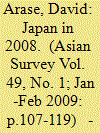

|
|
|
|
|
| Publication |
2009.
|
| Summary/Abstract |
Events in 2008 suggest that the Koizumi era is over and the Liberal Democratic Party will lose the lower house election that must be called before its current term expires in September 2009. The Democratic Party of Japan became the favorite to win the election and laid out the new domestic and foreign policy directions in which it will take Japan.
|
|
|
|
|
|
|
|
|
|
|
|
|
|
|
|
| 13 |
ID:
088925
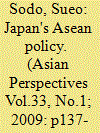

|
|
|
|
|
| Publication |
2009.
|
| Summary/Abstract |
Since the announcement of the Hashimoto Doctrine in 1997, Japan's proactive response to ever-changing Southeast Asia has been a main factor in advancing a new regionalism in East Asia.
|
|
|
|
|
|
|
|
|
|
|
|
|
|
|
|
| 14 |
ID:
159139


|
|
|
|
|
| Publication |
Oxon, Routledge, 2018.
|
| Description |
xxiii, 374p.pbk
|
| Standard Number |
9781138055452
|
|
|
|
|
|
|
|
|
|
|
|
Copies: C:1/I:0,R:0,Q:0
Circulation
| Accession# | Call# | Current Location | Status | Policy | Location |
| 059390 | 327.5205/BRO 059390 | Main | On Shelf | General | |
|
|
|
|
| 15 |
ID:
100263
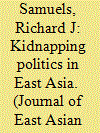

|
|
|
|
|
| Publication |
2010.
|
| Summary/Abstract |
In this article, I examine two contemporary cases in which the same foreign adversary, North Korea (DPRK), violated the sovereignty of neighboring states. I use a comparison of South Korean and Japanese reactions to political captivity to assess institutional performance in democratic states and ways in which these dynamics are connected to international politics. We see how "captivity narratives" can be differentially constructed and deployed and how policy capture can be achieved by determined political actors. Civic groups in both countries worked to mobilize political support, frame the issue for the media, and force policy change. In Japan, politicians were more willing to use the abduction issue for domestic political gain than in Korea, where the political class was determined to prevent human rights issues (including abductions) from interfering with their larger political agenda, including improved relations with the DPRK.
|
|
|
|
|
|
|
|
|
|
|
|
|
|
|
|
| 16 |
ID:
179973


|
|
|
|
|
| Summary/Abstract |
Why did Japanese Prime Minister Abe impose controversial export restrictions after rulings by the South Korean Supreme Court on wartime forced laborers? This article answers this question through the lens of domestic symbolism in economic sanctions studies. We argue that domestic political calculations led the Japanese government to adopt hawkish measures against South Korea. Abe wanted to ensure continued support from his constituents and to win the upcoming election. A series of political reforms since the early 1990s have empowered the prime minister and made LDP politicians pay more attention to public opinion than to factional topography. Strong anti-Korean sentiment among the Japanese public reduced the leadership’s concerns about the audience costs of economic countermeasures. Through an examination of the interplay among various domestic actors over the policy measure, this study provides insights on how domestic symbolism can serve as an origin of foreign policy decision-making in democracies.
|
|
|
|
|
|
|
|
|
|
|
|
|
|
|
|
| 17 |
ID:
160949
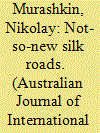

|
|
|
|
|
| Summary/Abstract |
Scholarly narratives concerning China's Belt and Road Initiative (BRI) tend to contextualise this project within China's rivalry with the United States and Japan. Such interpretations often reduce and misconstrue Japan's initiatives in Asian infrastructure finance as mere reactivity to China's advances. This paper will showcase Japan's own foreign and financial policies regarding infrastructure in Asia and the New Silk Road regions since the end of the Cold War. I argue that Japan's presence in that field is underappreciated and under-researched, as Japan's infrastructural footprint in the New Silk Road significantly pre-dates the BRI. Furthermore, I stress the fact that Japan's foreign policy in Asian infrastructure finance featured important cooperative postures toward China, especially within multilateral development banks. The paper makes a contribution to emerging scholarship on the BRI—often reliant on strategic communications and projections—by highlighting Japan's role in regional infrastructure to show how our understanding of international relations and international political economy in Asia can be better informed by economic history and area studies.
|
|
|
|
|
|
|
|
|
|
|
|
|
|
|
|
| 18 |
ID:
111565


|
|
|
|
|
| Publication |
2012.
|
| Summary/Abstract |
This article examines the enduring significance of the "Manchurian Problem" to pre-Second World War Japanese foreign policy and shows how the 1931 Manchurian incident and the creation of Manchukuo in 1932 came to be regarded by many in the Japanese government as the solution to this three-decade long problem. The focus of the analysis is the career of five-time foreign minister, Uchida Yasuya (1865-1936), who not only influenced policy from his positions as a diplomat in the field but also formulated Japan's Manchuria policy as foreign minister in parts of three successive decades. Uchida and many moderates like him voluntarily supported Army plans on the continent, suggesting that, in contrast to the conventional understanding that the founding of Manchukuo marked the beginning of Japanese expansionism and militarism, the events of the early 1930s represented the culmination of over three decades of Japanese efforts at solving the Manchurian problem.
|
|
|
|
|
|
|
|
|
|
|
|
|
|
|
|
|
|
|
|
|